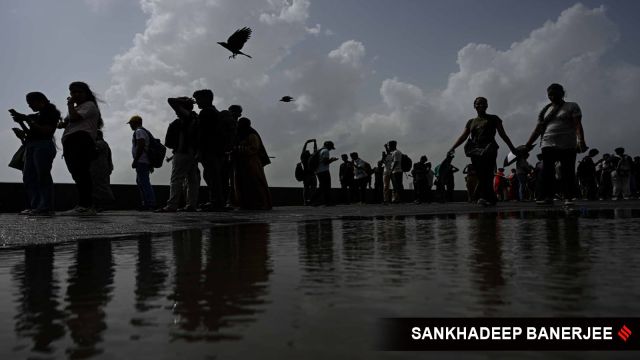Mumbai, neighbouring districts to witness heavy rainfall in next few days
IMD issues yellow alert in Mumbai, Thane, and Palghar for tomorrow; Raigad and Ratnagiri districts under orange alert.
 Tourists roam around at Marine Drive as IMD has sounded a yellow alert for the city, in Mumbai on 02 July 2025.
(Express photo by Sankhadeep Banerjee)
Tourists roam around at Marine Drive as IMD has sounded a yellow alert for the city, in Mumbai on 02 July 2025.
(Express photo by Sankhadeep Banerjee)Mumbai and its neighbouring districts of Thane and Palghar are set to witness significant rainfall in the next few days, with the India Meteorological Department (IMD) issuing a yellow alert for Thursday and then between Saturday and Sunday. The weather bureau has placed Raigad and Ratnagiri districts under an orange alert of ‘heavy to very rainfall between Thursday and Sunday.
After a brief lull, Mumbai city experienced intermittent spells of moderate showers on Wednesday.
Data showed that the IMD’s Colaba station clocked 7 mm of rainfall between Tuesday and Wednesday morning, while the Santacruz observatory recorded 4 mm of rainfall. Amid intensifying rain activity on Wednesday, IMD issued at least three nowcast warnings throughout the day, indicating the likelihood of intense spells of rainfall in Mumbai.
According to IMD, the city will experience heavy rainfall in isolated pockets on Thursday, following which the intensity of showers will recede by Friday. However, rain activity is slated to pick up after Saturday, when yet another yellow alert has been sounded in Mumbai as well as Thane and Palghar until Monday morning. Meanwhile, in Raigad and Ratnagiri districts, an orange alert has been issued in place.
What expert say on Mumbai rains
Weather expert Athreya Shetty attributed the current spells of showers to a low-pressure system over India. “While there is no off-shore trough present currently, there is a low-pressure area over Jharkhand and eastern Madhya Pradesh. This, along with the combined effect of the monsoon surge, is exerting a pull effect over the Konkan region, resulting in more rain,” explained Shetty.
Pointing to another low-pressure area slated to develop over eastern India and expected to move westwards, Shetty said that Mumbai may experience heavier showers over the weekend, starting July 6.
July is Mumbai’s wettest monsoon month, with Santacruz observatory receiving an average of 855 mm of rain, and Colaba coastal station recording 754 mm of rain during the month. Overall, the stations clock 2,318 mm of rain and 2095 mm of rain throughout the four months of monsoon, respectively.
So far, the Santacruz observatory has registered 906 mm of rain since May, while the Colaba station has received 1,109 mm of rain.


- 01
- 02
- 03
- 04
- 05





























